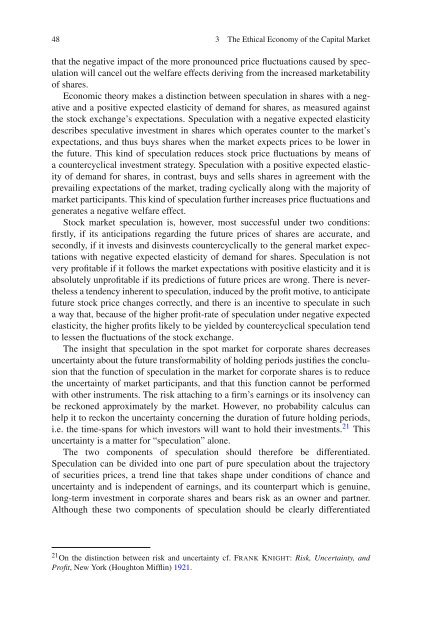The Ethics of Banking: Conclusions from the Financial Crisis (Issues ...
The Ethics of Banking: Conclusions from the Financial Crisis (Issues ...
The Ethics of Banking: Conclusions from the Financial Crisis (Issues ...
You also want an ePaper? Increase the reach of your titles
YUMPU automatically turns print PDFs into web optimized ePapers that Google loves.
48 3 <strong>The</strong> Ethical Economy <strong>of</strong> <strong>the</strong> Capital Market<br />
that <strong>the</strong> negative impact <strong>of</strong> <strong>the</strong> more pronounced price fluctuations caused by speculation<br />
will cancel out <strong>the</strong> welfare effects deriving <strong>from</strong> <strong>the</strong> increased marketability<br />
<strong>of</strong> shares.<br />
Economic <strong>the</strong>ory makes a distinction between speculation in shares with a negative<br />
and a positive expected elasticity <strong>of</strong> demand for shares, as measured against<br />
<strong>the</strong> stock exchange’s expectations. Speculation with a negative expected elasticity<br />
describes speculative investment in shares which operates counter to <strong>the</strong> market’s<br />
expectations, and thus buys shares when <strong>the</strong> market expects prices to be lower in<br />
<strong>the</strong> future. This kind <strong>of</strong> speculation reduces stock price fluctuations by means <strong>of</strong><br />
a countercyclical investment strategy. Speculation with a positive expected elasticity<br />
<strong>of</strong> demand for shares, in contrast, buys and sells shares in agreement with <strong>the</strong><br />
prevailing expectations <strong>of</strong> <strong>the</strong> market, trading cyclically along with <strong>the</strong> majority <strong>of</strong><br />
market participants. This kind <strong>of</strong> speculation fur<strong>the</strong>r increases price fluctuations and<br />
generates a negative welfare effect.<br />
Stock market speculation is, however, most successful under two conditions:<br />
firstly, if its anticipations regarding <strong>the</strong> future prices <strong>of</strong> shares are accurate, and<br />
secondly, if it invests and disinvests countercyclically to <strong>the</strong> general market expectations<br />
with negative expected elasticity <strong>of</strong> demand for shares. Speculation is not<br />
very pr<strong>of</strong>itable if it follows <strong>the</strong> market expectations with positive elasticity and it is<br />
absolutely unpr<strong>of</strong>itable if its predictions <strong>of</strong> future prices are wrong. <strong>The</strong>re is never<strong>the</strong>less<br />
a tendency inherent to speculation, induced by <strong>the</strong> pr<strong>of</strong>it motive, to anticipate<br />
future stock price changes correctly, and <strong>the</strong>re is an incentive to speculate in such<br />
a way that, because <strong>of</strong> <strong>the</strong> higher pr<strong>of</strong>it-rate <strong>of</strong> speculation under negative expected<br />
elasticity, <strong>the</strong> higher pr<strong>of</strong>its likely to be yielded by countercyclical speculation tend<br />
to lessen <strong>the</strong> fluctuations <strong>of</strong> <strong>the</strong> stock exchange.<br />
<strong>The</strong> insight that speculation in <strong>the</strong> spot market for corporate shares decreases<br />
uncertainty about <strong>the</strong> future transformability <strong>of</strong> holding periods justifies <strong>the</strong> conclusion<br />
that <strong>the</strong> function <strong>of</strong> speculation in <strong>the</strong> market for corporate shares is to reduce<br />
<strong>the</strong> uncertainty <strong>of</strong> market participants, and that this function cannot be performed<br />
with o<strong>the</strong>r instruments. <strong>The</strong> risk attaching to a firm’s earnings or its insolvency can<br />
be reckoned approximately by <strong>the</strong> market. However, no probability calculus can<br />
help it to reckon <strong>the</strong> uncertainty concerning <strong>the</strong> duration <strong>of</strong> future holding periods,<br />
i.e. <strong>the</strong> time-spans for which investors will want to hold <strong>the</strong>ir investments. 21 This<br />
uncertainty is a matter for “speculation” alone.<br />
<strong>The</strong> two components <strong>of</strong> speculation should <strong>the</strong>refore be differentiated.<br />
Speculation can be divided into one part <strong>of</strong> pure speculation about <strong>the</strong> trajectory<br />
<strong>of</strong> securities prices, a trend line that takes shape under conditions <strong>of</strong> chance and<br />
uncertainty and is independent <strong>of</strong> earnings, and its counterpart which is genuine,<br />
long-term investment in corporate shares and bears risk as an owner and partner.<br />
Although <strong>the</strong>se two components <strong>of</strong> speculation should be clearly differentiated<br />
21 On <strong>the</strong> distinction between risk and uncertainty cf. FRANK KNIGHT: Risk, Uncertainty, and<br />
Pr<strong>of</strong>it, New York (Houghton Mifflin) 1921.

















